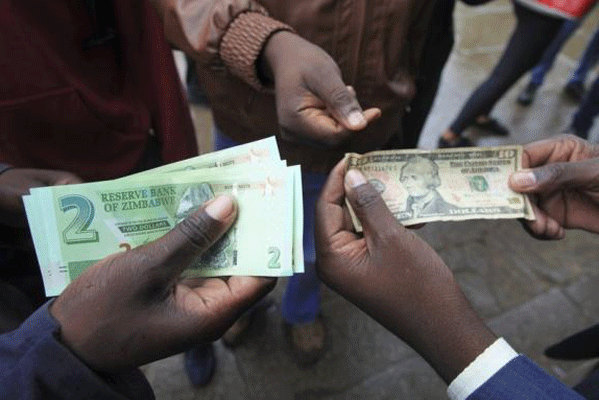
THE city of Masvingo, located in south of Zimbabwe, acts as a major transit and connection point for the hundreds of thousands of travellers going to and from South Africa.
BY TApiwa ZiviRA
The city connects to key metropoli like Gweru, Mutare, Harare, and Bulawayo, virtually making it a busy passageway, where the majority of its activities — especially in this era of economic turmoil — are resultantly centred on cross-border trade, transportation of people travelling between Zimbabwe and South Africa and distribution of goods imported from South Africa.
The city is also the first main entry point for travellers to the rest of the African countries.
With this unique role, it appears Masvingo has not been spared the country’s cash crisis, where travellers and traders are forced to “buy” money at rates higher than elsewhere in the country, a situation compounded by the increasing demand for foreign products, as Zimbabwe’s manufacturing sector continues to suffocate under President Robert Mugabe’s economic policies.
The once-highly productive country has been reduced into an empty shell relying on other countries for manufactured products.
Once a bustling centre, Masvingo has virtually become a brief “bus stop” for cross border traders and other travellers, and due to the informalisation of the country’s economy, not much benefit is derived either by the municipality or the residents.
Masvingo mayor, Hubert Fidze, pointed at the current economic crisis as the major challenge.
- Chamisa under fire over US$120K donation
- Mavhunga puts DeMbare into Chibuku quarterfinals
- Pension funds bet on Cabora Bassa oilfields
- Councils defy govt fire tender directive
Keep Reading
“With the current situation, there is little to derive from the equidistant position of the town,” he said.
Observations showed that the little revenue Masvingo could be getting was from regulation — in the form of clamping and terminus fees for cross border buses, an activity they compete with national traffic police.
While food retailers and vendors at strategic places where buses stop appeared to be registering brisk business, the underlying decline, underpinned by the cash crisis, was evident from interviews NewsDay carried out with the retailers, cross border traders and vendors.
Simbiso Mavura, a cross-border trader who has been shuttling between Mutare and Johannesburg via Masvingo and Beitbridge for the past 12 years, believes this year has been the most difficult.
“I used to spend a night in Masvingo while travelling to South Africa, but right now I cannot afford that anymore as my business is not doing so well and the profit margins are shrinking going down,” she said.
Mavura’s decision appears to resonate with a survey NewsDay carried out at local lodges.
A receptionist at one of the lodges located just outside the city centre said occupancy levels have significantly gone down this year.
“People are not coming as previously and I think it is because of the increasing hardships. We used to have travellers who preferred to stay the night in the city, but I think many now prefer to pass to save costs,” she said.
“We normally charge $30 a night, but these days we are sometimes forced to reduce the fare just to make some buck. We used to be always fully booked, but not anymore.”
By their nature, transit cities draw a lot of revenue from travellers who use food and accommodation facilities.
While the cash crisis appears the same as everywhere, the burden is bigger for cross border traders in Masvingo as the demand for the South African rand gets higher.
“You can imagine right now, money dealers sell every R10 for $1,70 of bond notes and $1,50 for US dollars, and if you are transferring the money via EcoCash or bank, you end up buying R10 for $2, and this makes no business sense at all,” a trader who identified herself as Mavis, said.
In the end, she added, she passes on the burden to her clients, who she said are dwindling.
Masvingo relies more on South Africa for manufactured products due to its proximity to the South African border town of Musina.
This has left many retailers preferring to order their goods from Musina, but lately, it has been more difficult as the rand becomes more expensive to buy, a situation abated by the escalation in the hardships, where the standards of living for ordinary Zimbabweans are going down drastically.
A survey in shops situated in and close to the city centre showed the majority of goods are imported from South Africa and formal retailers who spoke to NewsDay said they are increasingly finding it difficult to acquire goods, and they are also losing the war against vendors.
“As the availability of the US dollars dwindles, we are failing to acquire goods since we mostly import from South Africa.We have to buy the rand, and that makes our goods more expensive,” said a shop owner who runs a grocery store in the CBD.
Like in a number of cities in the country, Masvingo has vendors who sell their wares — which include groceries, clothing and electrical — outside shops.
Although NewsDay could not officially verify, shop owners claimed the vendors, who sell wares at lower prices, are part of a syndicate that involves politically connected and powerful individuals who facilitate the passage of goods from South Africa into Zimbabwe bypassing the official customs channels.
“It is clear that when a vendor sells a packet of washing powder for $3,50 when it normally costs $6, may not have paid customs duty.”
In addition to selling the low priced goods, the pavement vendors also act as the biggest cash barons, trading to locals and travellers.
Attempts to enquire where they get the cash hit a snag as they remained mum and refused to be interviewed.











